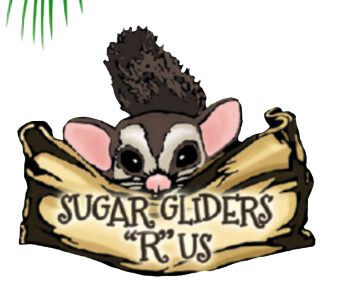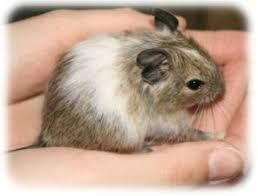Origin
Found in the lowland areas of Chile in South America.
Description
A Degu is a small rodent that is closely related to the Guinea Pig and Chinchilla. Degus are very social, inquisitive animals and can be very vocal (love it). The overall size for a Degu is 5 to 7 inches. Degus live up to 7 years in captivity.
Feeding
A good diet consist of Degu Dinner* with a sprinkle of Degu Booster (Multi-Vitamin)* . Healthy treats are Monkey Biscuits*, Critter Blocks*, Apple & Oat Puff Sticks*, Timothy Puff Sticks* and Sugar Beets*. Peanuts in the shell* can be offered as a treat and the gnawing through the hard shell on the nut is very good for their teeth. Small amounts of fresh grass can be given them and whatever they don't eat, the Degus will use for a bed. Do not overfeed or give too many treats. Fruit should rarely be offered as it may lead to diarrhea or even diabetes.
Housing
Degus should be housed in a cage with a solid bottom. A wire cage allows them to climb and provides better air circulation. They are very active pets and need lots of space. Igloos* or clay pots can be used as a hide box or nest box for them. Branches*, bird perches*, untreated blocks of wood, cardboard tubes or brown paper bags can be used for playthings. Just make sure that any items used for playthings are harmless. Degus will drink from a water bottle. The floor of the cage should have a deep bed of shavings* (not pine or cedar) in which they can hide, nest and eat. Degus are very clean animals and have very little natural odor. They may use a dry bath in which a shoebox is filled with about one inch of chinchilla dust is offered to them.
Gnawing
The teeth of a Degu grow constantly. If their diet is too soft and you do not give them anything to wear the enamel down, their teeth will soon overgrow their mouths. Blocks of untreated wood, branches*, Critter Blocks*, Carrot Roller Toy* and Barrel Roller Toy* help keep their teeth ground down.
Breeding
Degus usually produce two litters a year. Gestation is about ninety days and they may produce from 1 to 10 offspring. The babies are born with fur and with their eyes open.
Note
Care should be taken when handling a Degu as the tail is very fragile and can be shed. Once lost, the tail will not regrow:(

